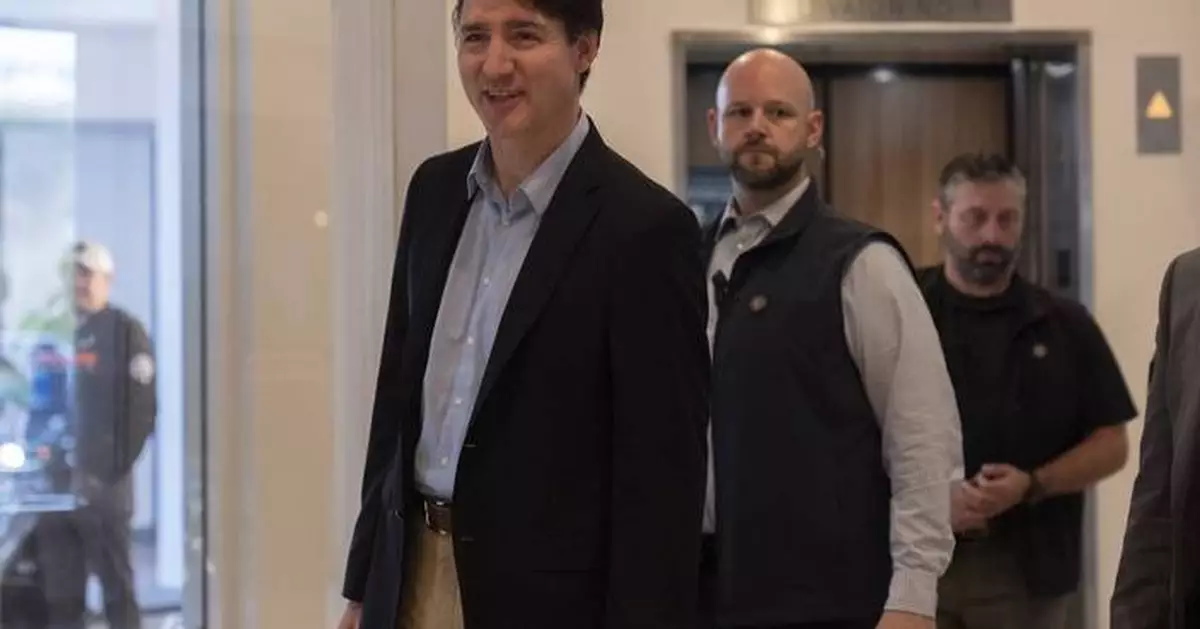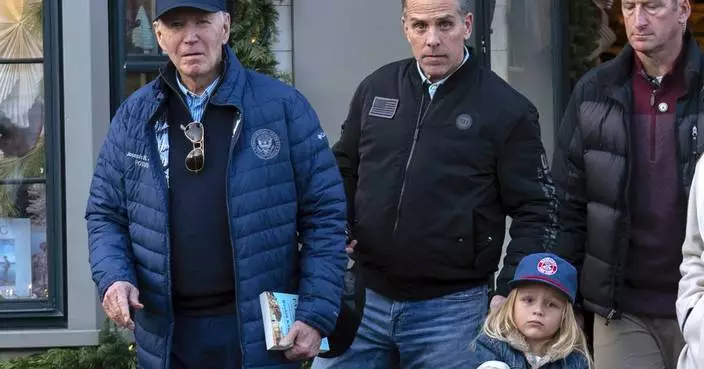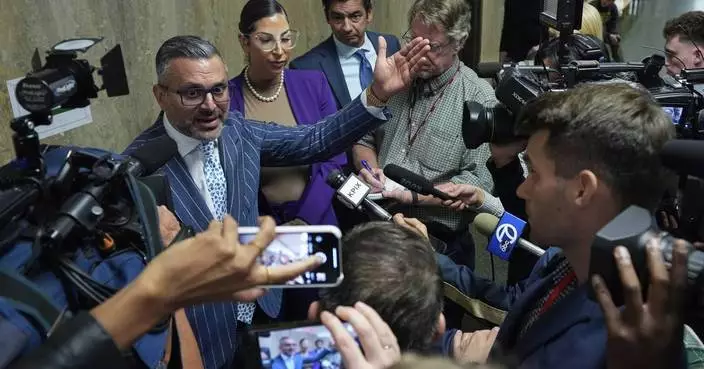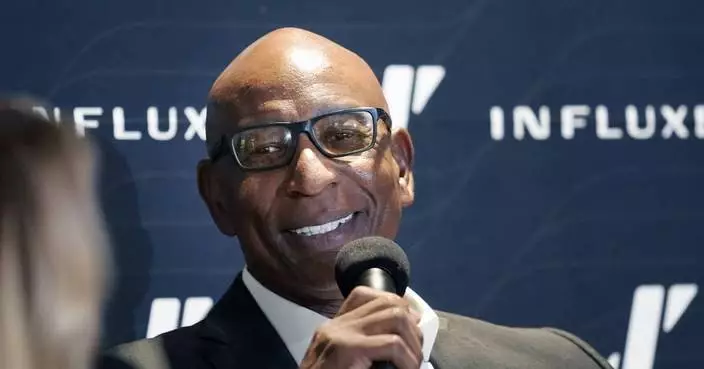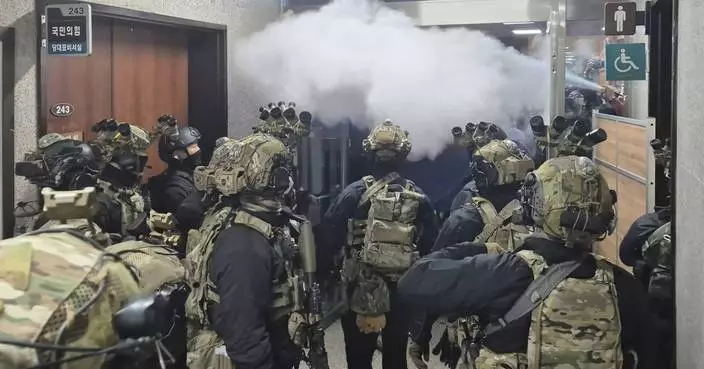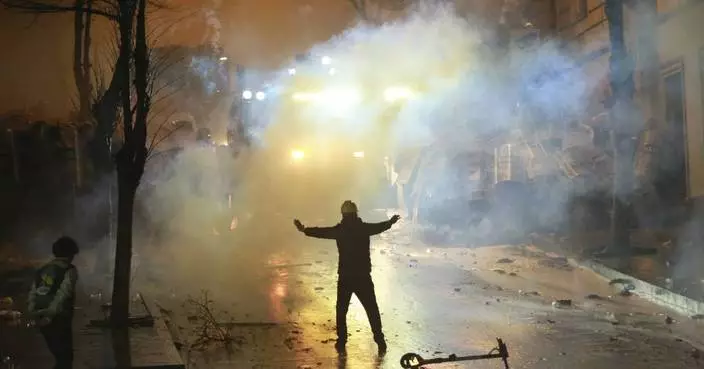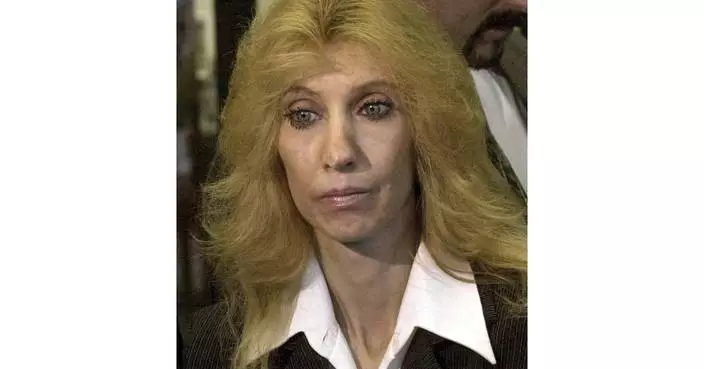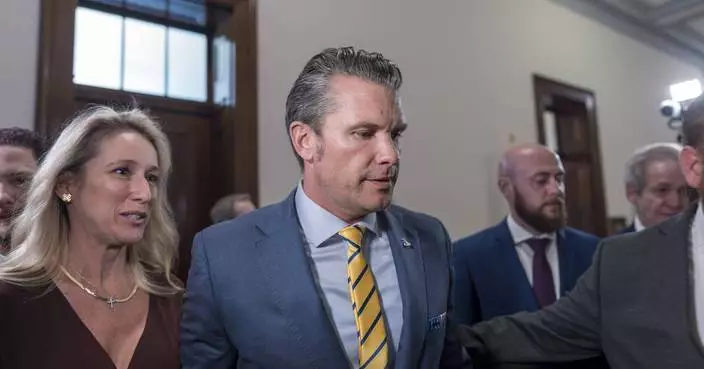TORONTO (AP) — President-elect Donald Trump was joking when he suggested Canada become the 51st U.S. state during a dinner with Prime Minister Justin Trudeau, a Canadian minister who attended their recent dinner said Tuesday.
Fox News reported that Trump made the comment in response to Trudeau raising concerns that Trump's threatened tariffs on Canada would damage Canada's economy.
Public Safety Minister Dominic LeBlanc, who attended the Friday dinner at Trump's Mar-a-Lago club, said Trump's comments were in jest.
“The president was telling jokes. The president was teasing us. It was, of course, on that issue, in no way a serious comment,” LeBlanc told reporters in Ottawa.
LeBlanc described it as a three-hour social evening at the president’s residence in Florida on a long weekend of American Thanksgiving. “The conversation was going to be light-hearted,” he said.
He called the relations warm and cordial and said the fact that “the president is able to joke like that for us” indicates good relations.
On Tuesday, Trump appeared to continue with the joke, posting on his Truth Social platform an AI-generated image of himself standing on a mountain with a Canadian flag next to him with the caption “Oh Canada!"
Gerald Butts, a former top adviser to Trudeau and a close friend, said Trump has done this before.
“Trump used the ”51st State" line with Trudeau a lot during his first term," Butts wrote in a post on LinkedIn. “When someone is trying to get you to freak out, don't. #protip”
Earlier last week, the Republican president-elect threatened to impose a 25% tax on all products entering the U.S. from Canada and Mexico unless they stem the flow of migrants and drugs.
Trudeau requested the meeting in a bid to avoid the tariffs by convincing Trump that the northern border is nothing like the U.S. southern border with Mexico.
Trudeau held a rare meeting with opposition leaders on Tuesday about U.S-Canada relations and later said that opposition Conservative leader Pierre Poilievre shouldn’t amplify the erroneous narratives that Americans are saying about the border.
“Less than one percent of migrants coming into the United States irregularly come from Canada and 0.2 percent of the fentanyl coming into the United States comes from Canada,” Trudeau said in Parliament.
Canadian officials have said there are plans to put more helicopters, drones and law enforcement officers at the border.
At the dinner, Kristen Hillman, Canada's ambassador to the U.S., said America’s trade deficit with Canada was also raised. Hillman said the U.S. had a $75 billion trade deficit with Canada last year but noted a third of what Canada sells into the U.S. is energy exports and prices have been high.
“Trade balances are something that he focuses on so it’s important to engage in that conversation but to put it into context,” Hillman told The Associated Press. “We are one-tenth the size of the United States so a balanced trade deal would mean per capita we are buying 10 times more from the U.S. than they are buying from us. If that’s his metric we will certainly engage on that.”
Hillman said Canada sold $170 billion worth of energy products last year to the U.S.
About 60% of U.S. crude oil imports are from Canada, and 85% of U.S. electricity imports as well.
Canada is also the largest foreign supplier of steel, aluminum and uranium to the U.S. and has 34 critical minerals and metals that the Pentagon is eager for and investing for national security.
About 77% of Canada’s exports go to the U.S.
Trudeau's government successfully employed a “Team Canada” approach during Trump’s first term in office when the free trade deal between Canada, the U.S. and Mexico was renegotiated. But Trudeau’s minority government is in a much weaker position politically now and faces an election within a year.
Poilievre, Canada's opposition leader, said the tariffs would harm Americans.
“The president-elect was elected on a promise to make America richer. These tariffs would make America poorer,” Poilievre said after meeting with Trudeau.
Poilievre said the U.S. would be wise to do more free trade with its best friend and closest ally.
Canada is the top export destination for 36 U.S. states. Nearly 3.6 billion Canadian dollars ($2.7 billion) worth of goods and services cross the border each day.
Trudeau returned home after the dinner at Mar-a-Lago club in Florida without assurances Trump would back away from threatened tariffs on all products from the major American trading partner. Trump called the talks “productive” but signaled no retreat from a pledge that Canada says unfairly lumps it in with Mexico over the flow of drugs and migrants into the United States.
The flows of migrants and seizures of drugs are vastly different. U.S. customs agents seized 43 pounds of fentanyl at the Canadian border during the last fiscal year, compared with 21,100 pounds at the Mexican border.
Most of the fentanyl reaching the U.S. — where it causes about 70,000 overdose deaths annually — is made by Mexican drug cartels using precursor chemicals smuggled from Asia.
On immigration, the U.S. Border Patrol reported 1.53 million encounters with irregular migrants at the southwest border with Mexico between October 2023 and September 2024. That compares to 23,721 encounters at the Canadian border during that time.
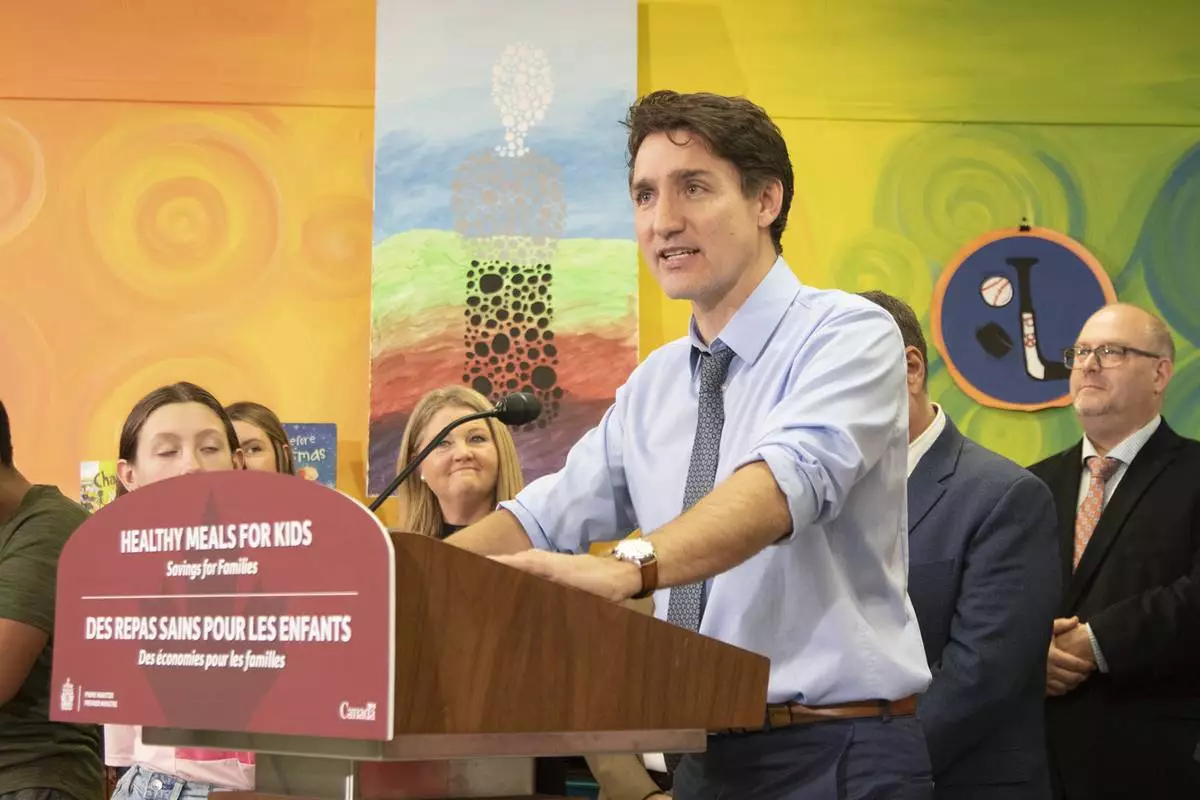
Canada Prime Minister Justin Trudeau speaks at an event where it was announced that Prince Edward Island has signed on to the Federal School food program, in Mount Stewart, Prince Edward Island, Canada, Friday, Nov. 29, 2024. (Ron Ward/The Canadian Press via AP)
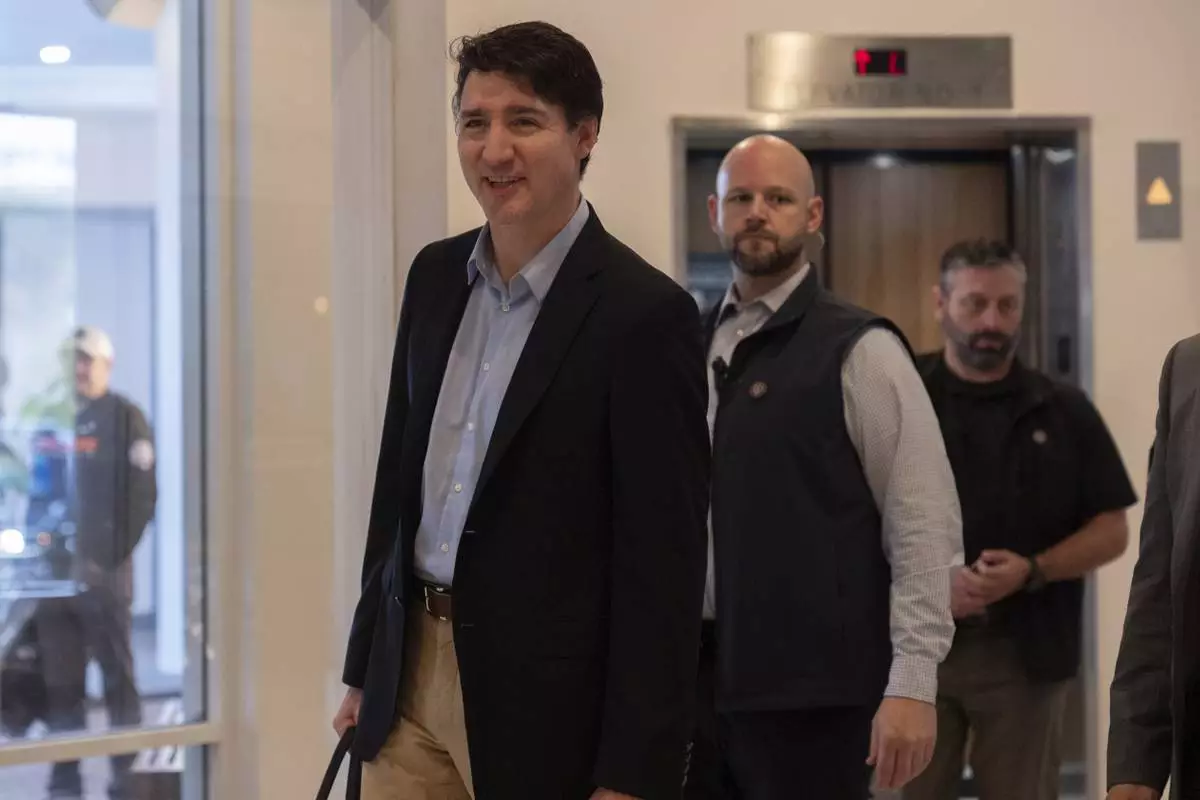
Canada Prime Minister Justin Trudeau walks through the lobby of the Delta Hotel by Marriott, Saturday, Nov. 30, 2024, in West Palm Beach, Fla. (AP Photo/Carolyn Kaster)
TOKYO (AP) — South Korea spent about six hours under martial law after President Yoon Suk Yeol issued a sudden, shocking declaration that harkened to the country's past dictatorships.
Troops surrounded parliament after Yoon accused pro-North Korean forces of plotting to overthrow one of the world’s most vibrant democracies. Lawmakers voiced outrage and voted to end the declaration, and the president lifts the decree before daybreak Wednesday.
The actions brought high drama for an unpopular leader who has struggled to get his agenda through an opposition-dominated parliament while corruption scandals involving him and his wife. Yoon gave no direct evidence when he raised the specter of North Korea as a destabilizing force. Yoon has long maintained that a hard line against the North is the only way to stop Pyongyang from following through on its nuclear threats against Seoul.
Here's what to know about the situation in South Korea:
Immediately after Yoon's declaration the military chief called in key commanders for talks. South Korean troops set up barricades and then made their way into parliament.
The leader of the main opposition, which controls parliament, ordered lawmakers to return to the building, where they eventually voted to lift the declaration of martial law.
Yoon lifted the martial law decree around 4:30 a.m. during a Cabinet meeting.
Yoon's declaration had been accompanied by an accusation that the opposition was engaged in “anti-state activities plotting rebellion.” But he did not explain what that means, and provided no specific evidence.
In the late 1980s, South Korea had a series of strongmen repeatedly invoked North Korea when struggling to control domestic dissidents and political opponents.
The opposition lambasted Yoon's move as undemocratic. Opposition leader Lee Jae-myung, who narrowly lost to Yoon in the 2022 presidential election, called Yoon’s announcement “illegal and unconstitutional.”
But the sudden declaration was also opposed by the leader of Yoon's own conservative party, Han Dong-hoon, who called the decision “wrong” and vowed to “stop it with the people.”
“The people will block the president’s anti-constitutional step. The military must be on the side of the public in any case. Let’s resolutely oppose it,” Kim Dong Yeon, the opposition party governor of Gyeonggi province, which surrounds Seoul, wrote on X.
Average South Koreans were in shock. Social media was flooded with messages expressing surprise and worry over Yoon’s announcement.
There were quick claims that the emergency declaration was linked to Yoon’s political struggles.
His approval rating has dropped, and he has had little success in getting his policies adopted by a parliament that has been controlled by the opposition since he took over in 2022.
Conservatives have said the opposition moves are political revenge for investigations into the opposition leader, who is seen as the favorite for the next presidential election in 2027.
Just this month, Yoon denied wrongdoing in an influence-peddling scandal involving him and his wife. The claims have battered his approval ratings and fueled attacks by his rivals.
The scandal centers on claims that Yoon and first lady Kim Keon Hee exerted inappropriate influence on the conservative ruling People Power Party to pick a certain candidate to run for a parliamentary by-election in 2022 at the request of Myung Tae-kyun, an election broker and founder of a polling agency who conducted free opinion surveys for Yoon before he became president.
Yoon has said he did nothing inappropriate.
South Korea became a democracy only in the late 1980s, and military intervention in civilian affairs is still a touchy subject.
During the dictatorships that emerged as the country rebuilt from the destruction of the 1950-53 Korean War, leaders occasionally proclaimed martial law that allowed them to station combat soldiers, tanks and armored vehicles on streets or in public places to prevent anti-government demonstrations.
Such scenes are unimaginable for many today.
The dictator Park Chung-hee, who ruled South Korea for nearly 20 years before he was assassinated by his spy chief in 1979, led several thousand troops into Seoul in the early hours of May 16, 1961, in the country’s first successful coup. During his rule, he occasionally proclaimed martial law to crack down on protests and jail critics.
Less than two months after Park Chung-hee’s death, Maj. Gen. Chun Doo-hwan led tanks and troops into Seoul in December 1979 in the country’s second successful coup. The next year, he orchestrated a brutal military crackdown on a pro-democracy uprising in the southern city of Gwangju, killing at least 200 people.
In the summer of 1987, massive street protests forced Chun’s government to accept direct presidential elections. His army buddy Roh Tae-woo, who had joined Chun’s 1979 coup, won the election held later in 1987 thanks largely to divided votes among liberal opposition candidates.
AP writers Kim Tong-hyung and Hyung-jin Kim in Seoul, South Korea, contributed to this story.
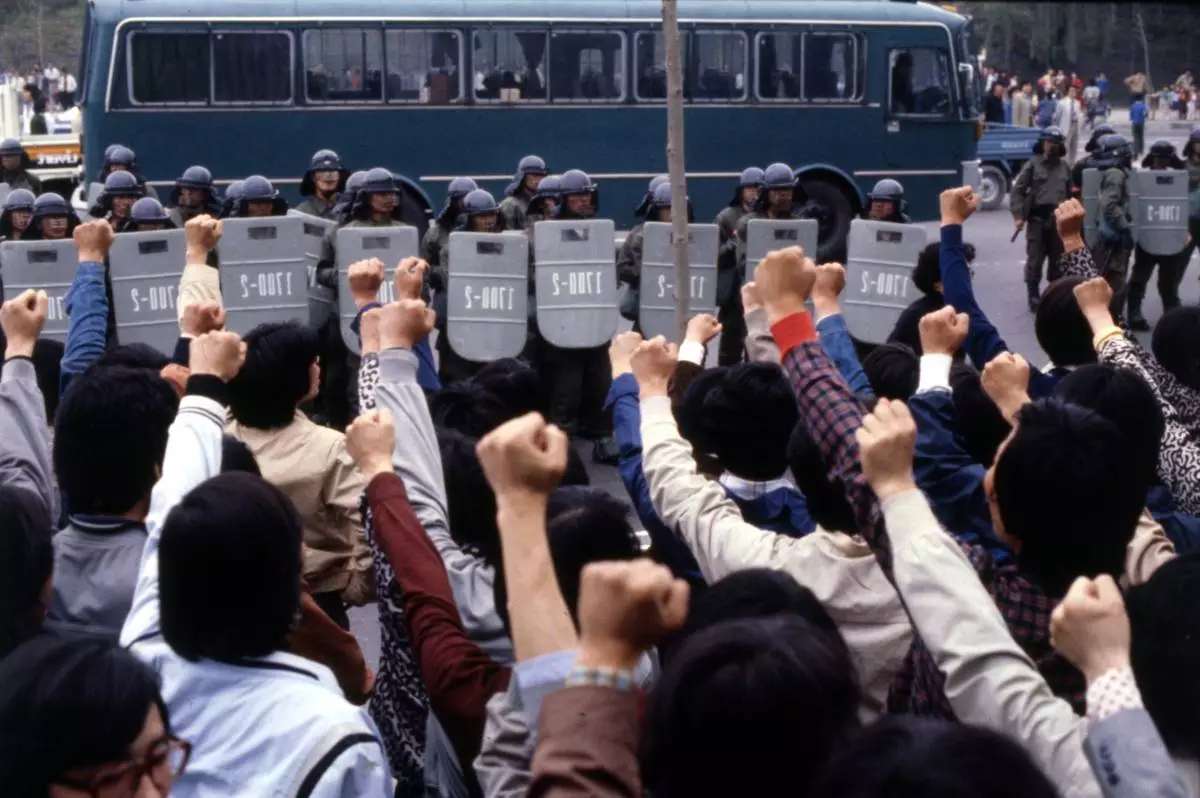
FILE - Mass students demonstrators demand the lifting of martial law and the resignation of Premier Shin Hyon-Hwack and Korean Central Intelligence chief Lt. Gen. Chun Doo-Hwan, in May 1980. (AP Photo, File)
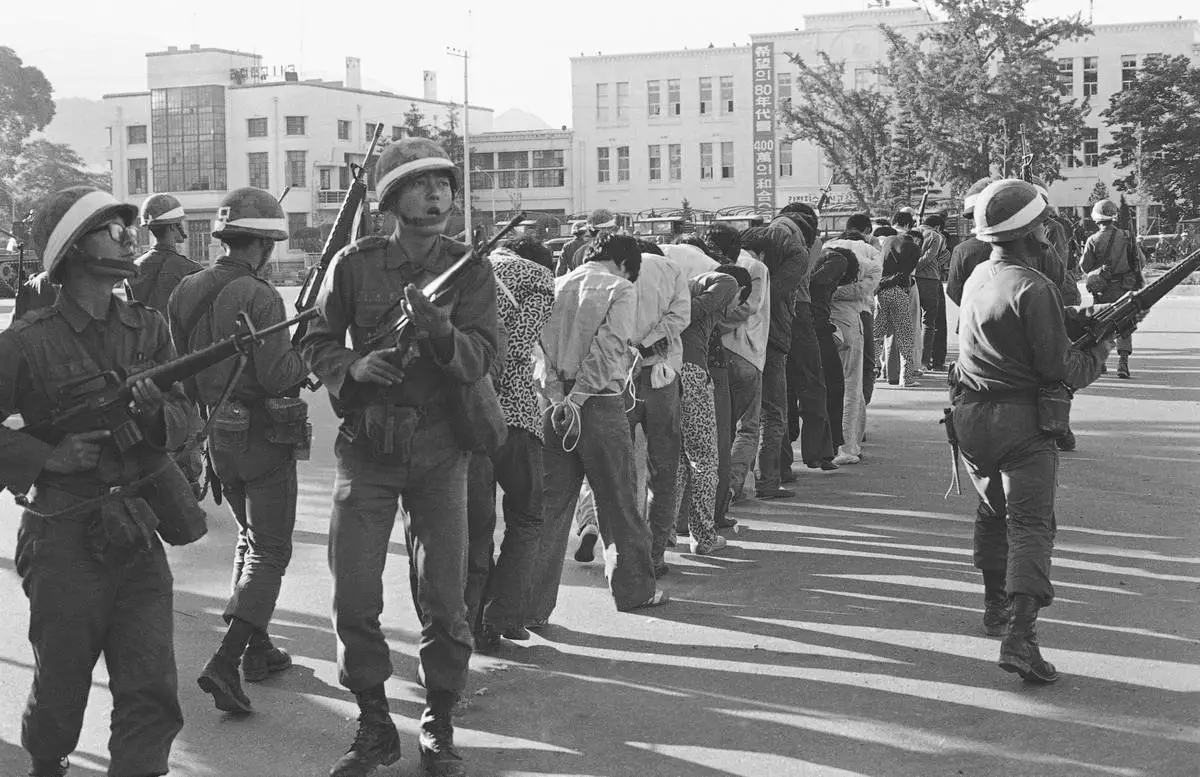
FILE - Armed South Korean government martial law troops guard captured rebels in Gwangju (Kwangju), South Korea, on May 27, 1980. The rebels were rounded up following the government's recapture by the riot-battered city. (AP Photo/Sadayuki Mikami, File)
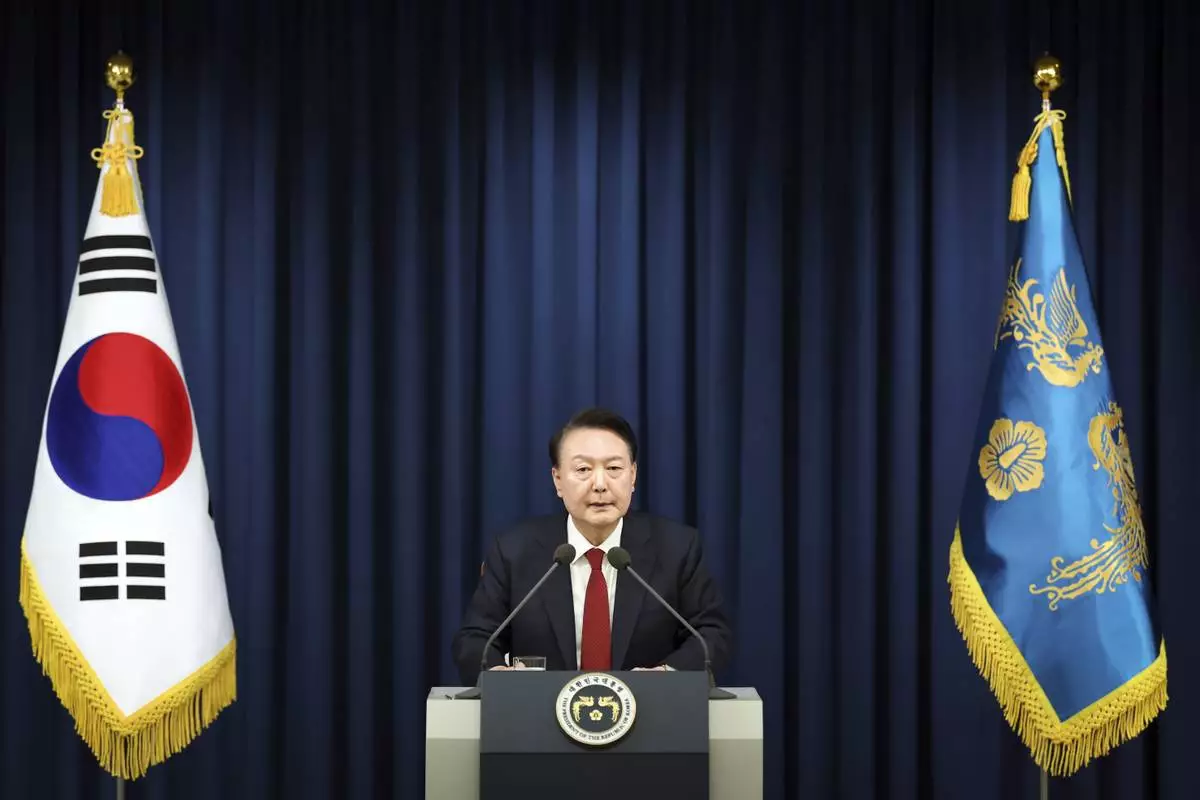
In this photo provided by South Korea Presidential Office, South Korean President Yoon Suk Yeol speaks during a press briefing at the presidential office in Seoul, South Korea, Tuesday, Dec. 3, 2024. (South Korea Unification Ministry via AP).
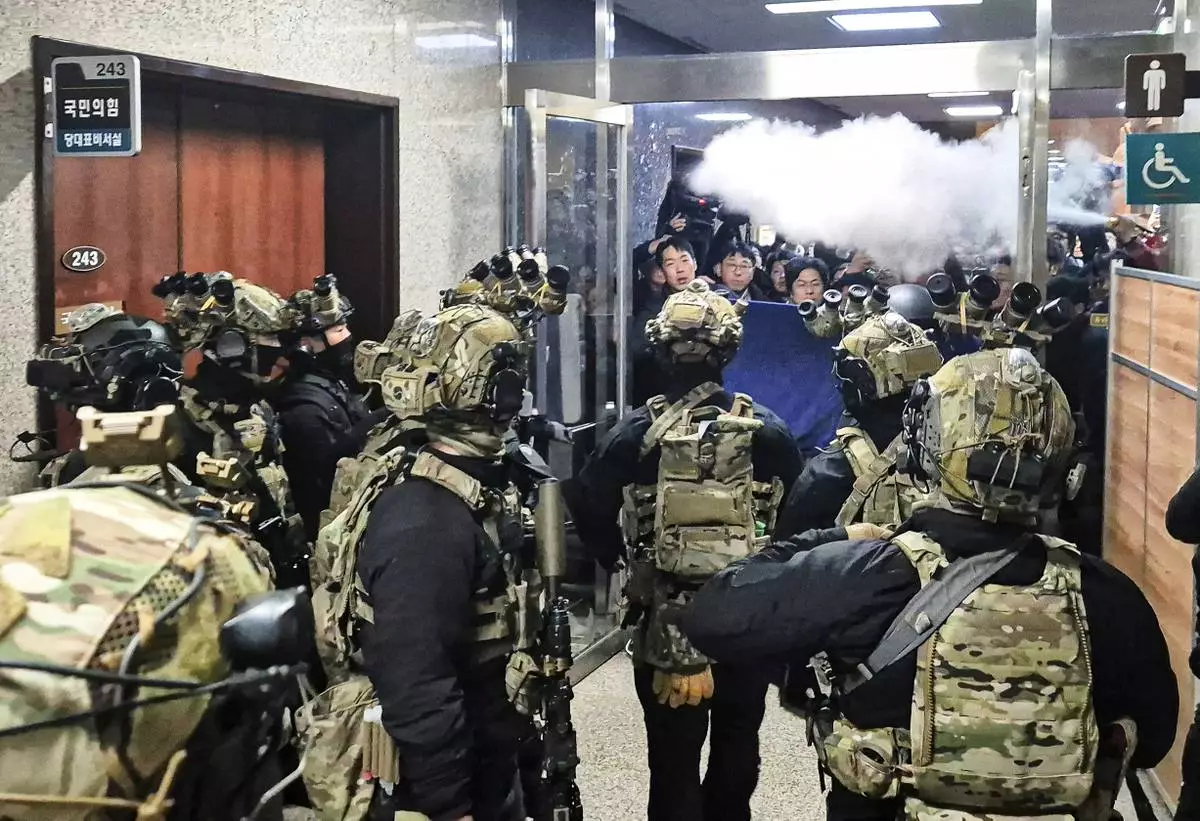
A National Assembly staff sprays fire extinguishers to block soldiers entering the main hall of the National Assembly in Seoul, South Korea, Wednesday, Dec. 4, 2024. (Jo Da-un/Yonhap via AP)
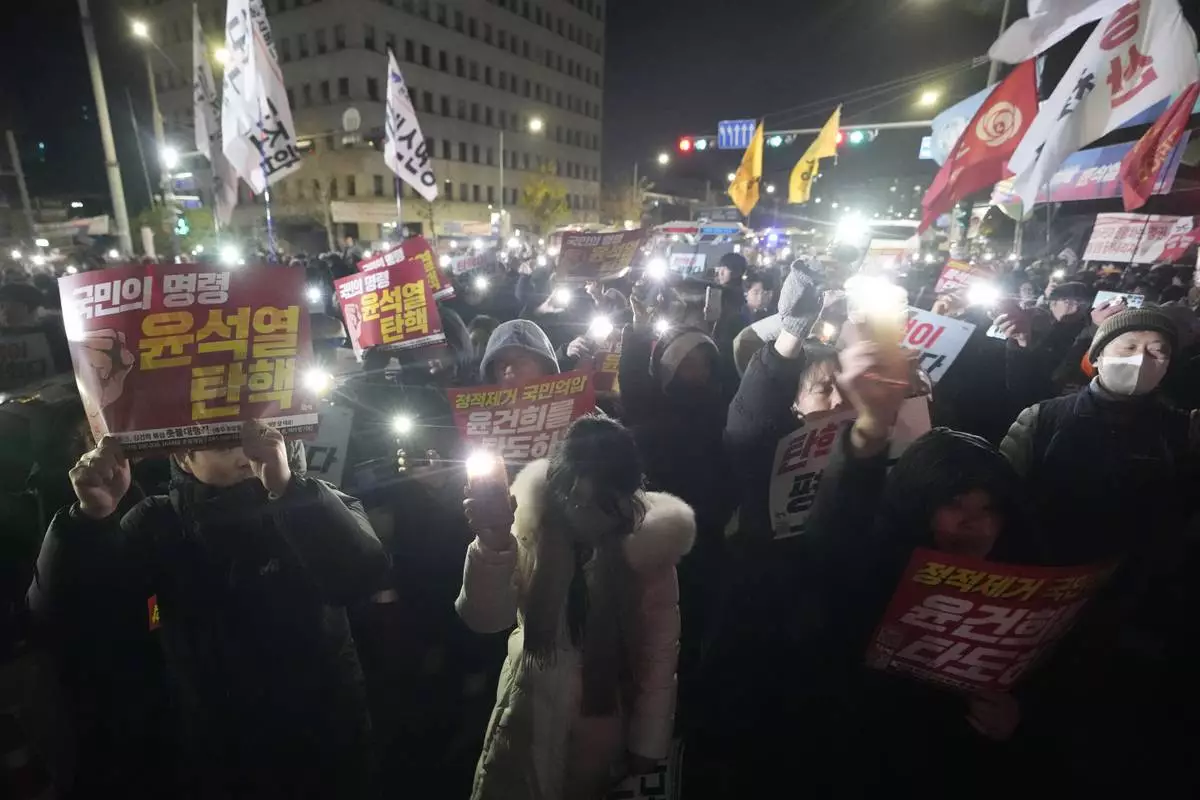
People gather to demand South Korean President Yoon Suk Yeol to step down in front of the National Assembly in Seoul, South Korea, Wednesday, Dec. 4, 2024. (AP Photo/Ahn Young-joon)
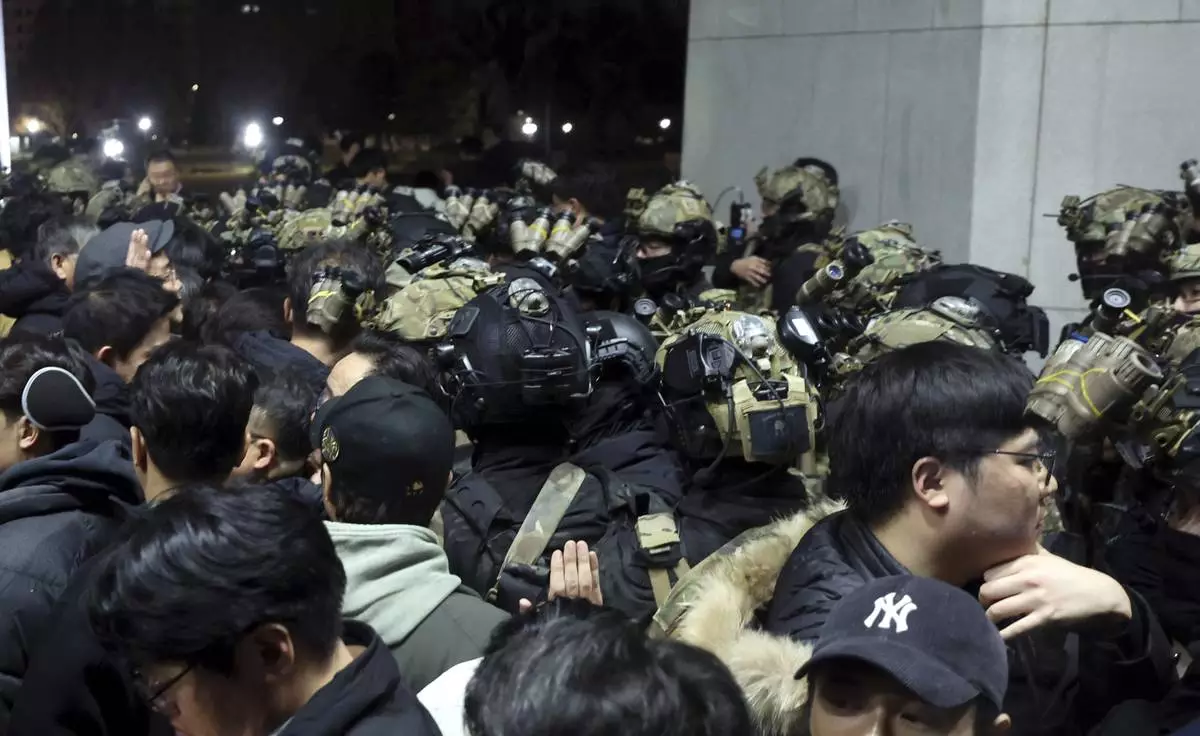
South Korean martial law soldiers try to enter the National Assembly compound in Seoul, South Korea, Wednesday, Dec. 4, 2024. (Cho Sung-bong/Newsis via AP)
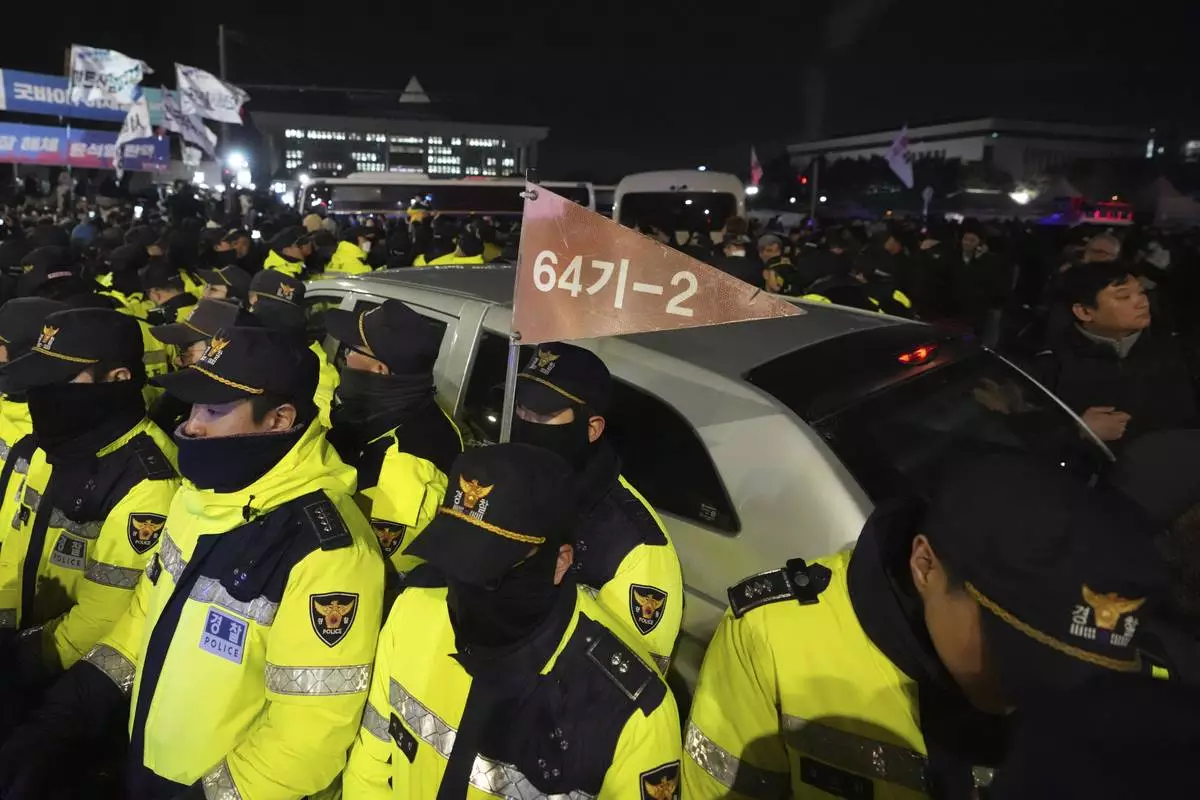
Police officers stand outside the National Assembly in Seoul, South Korea, Wednesday, Dec. 4, 2024. (AP Photo/Lee Jin-man)




